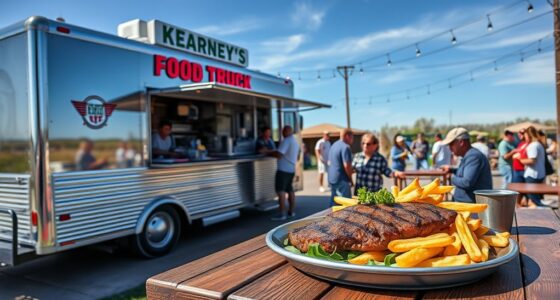Exploring lobster and seafood in Lewiston’s food trucks lets you enjoy fresh, local Maine catches with a quick, casual twist. These trucks serve up regional specialties, from lobster rolls to seafood tacos, often at busy downtown spots like Mill 5 Food Hub. Keep in mind that licensing and safety standards are key to finding legitimate vendors. If you want to discover the best spots and learn tips for a successful seafood experience, there’s plenty more to uncover.
Key Takeaways
- Maine lobster is sustainably harvested year-round, ensuring fresh, high-quality seafood for Lewiston food trucks.
- Licensing from Maine and Lewiston is essential for legal operation of seafood food trucks in the area.
- Popular locations like Mill 5 Food Hub and downtown Lewiston attract steady crowds for seafood trucks.
- Strict health and safety standards require proper temperature control, sanitation, and sourcing from licensed suppliers.
- Marketing regional, sustainable seafood through social media and local events boosts visibility and customer engagement.
Understanding Maine’s Seafood Food Truck Scene

Maine’s seafood food truck scene has transformed into a dynamic and growing industry that combines regional authenticity with nationwide appeal. You’ll find flagship brands like Cousins Maine Lobster, which started in 2012 and now operates over 85 trucks across 35 states, bringing Maine lobster to a broad audience. These trucks emphasize fast-casual, approachable seafood, blending convenience with authentic regional flavors. Expansion beyond Maine is rapid, especially in the Midwest and other regions, fueled by franchising. Low overhead costs make it easier for entrepreneurs to enter the market, while menu innovation, including seasonal items and new lobster roll variations, keeps customers engaged. Cousins Maine Lobster has surpassed $1 billion in systemwide sales since its founding, reflecting its significant growth and popularity. Additionally, the rise of food truck culture has helped diversify the way consumers experience regional cuisine. Overall, this scene offers a perfect mix of tradition and modern food trends, making Maine seafood accessible and popular across the country.
Navigating Licensing and Permits for Seafood Trucks in Lewiston
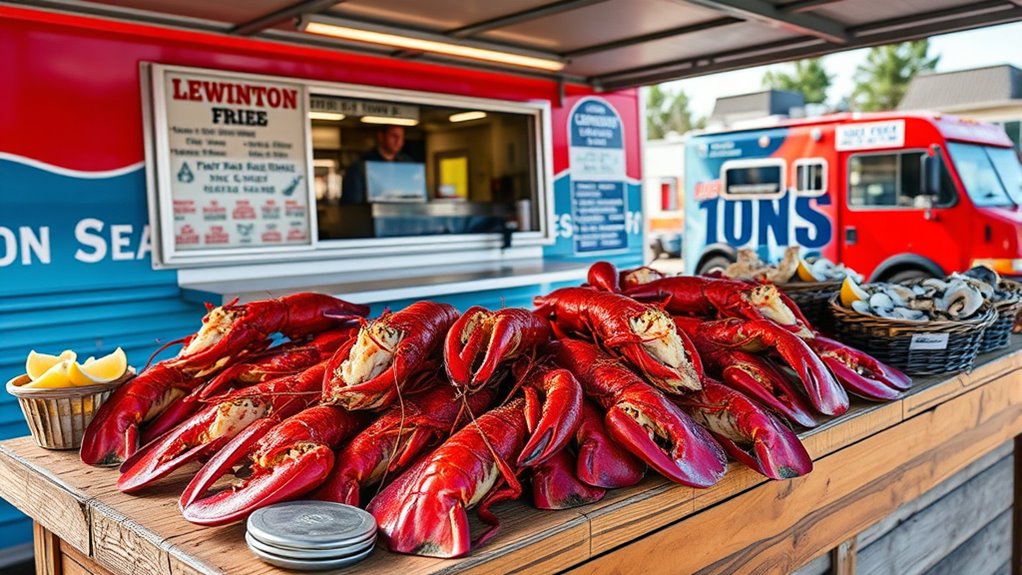
To operate a seafood food truck in Lewiston, you must navigate a thorough licensing process that guarantees compliance with local and state health standards. First, you need to secure a State of Maine Mobile Food Service License from the Department of Health and Human Services. Second, obtain a City of Lewiston Mobile Unit License to operate within city limits. Both licenses must be current and visibly displayed. Third, licenses require renewal every year, so stay on top of your renewal dates. Fourth, submit your application at least 30 days before starting your business to allow for plan review and inspections. Completing these steps guarantees your seafood truck remains legal and compliant, helping you serve Lewiston’s seafood lovers without interruptions. Additionally, you should verify any specific local zoning and parking permits required by the city to avoid penalties. Properly handling licensing requirements ensures your business operates smoothly and within legal boundaries.
Key Health and Safety Standards for Seafood Food Vendors
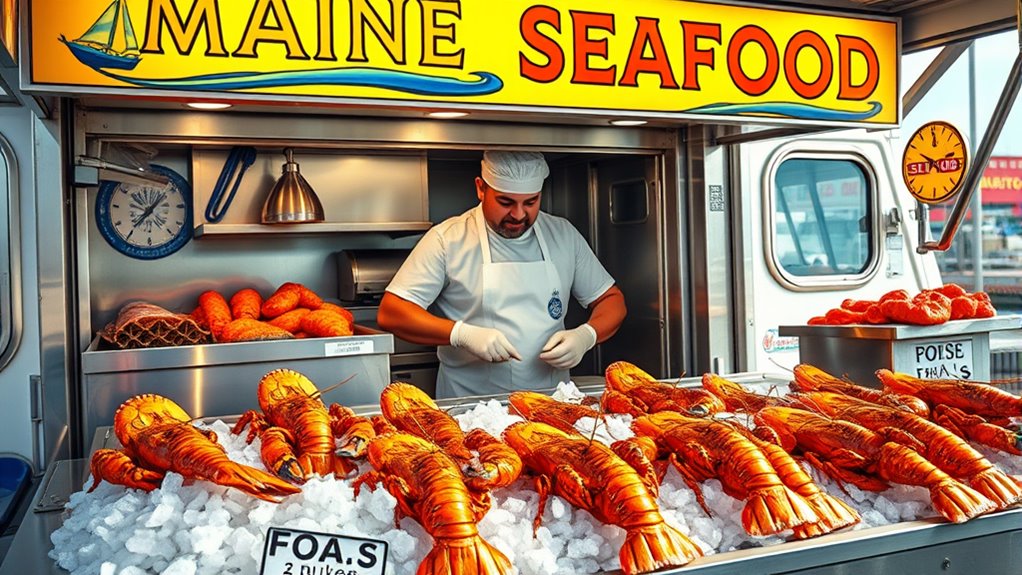
Maintaining strict health and safety standards is crucial for seafood vendors to safeguard customers and guarantee compliance. You must follow Maine Food Code requirements, including employee training on hygiene policies and frequent handwashing with accessible sinks. Employees with symptoms of contagious illnesses should be restricted from handling food until cleared. Using disposable gloves and single-use utensils is indispensable when handling hazardous foods like raw seafood. Proper temperature controls and refrigeration prevent bacterial growth in high-risk products. You need a three-compartment sink or approved dishwashing system for cleaning utensils. Seafood must be sourced from licensed suppliers, and cross-contamination between raw and cooked foods should be prevented with designated storage and prep areas. Implementing proper food safety practices] is essential for maintaining quality and preventing foodborne illnesses. Regular inspections ensure ongoing compliance with these health and safety standards. Additionally, maintaining accurate records of seafood sourcing and storage practices is essential for traceability and accountability.
Top Locations to Enjoy Seafood Truck Offerings in Lewiston
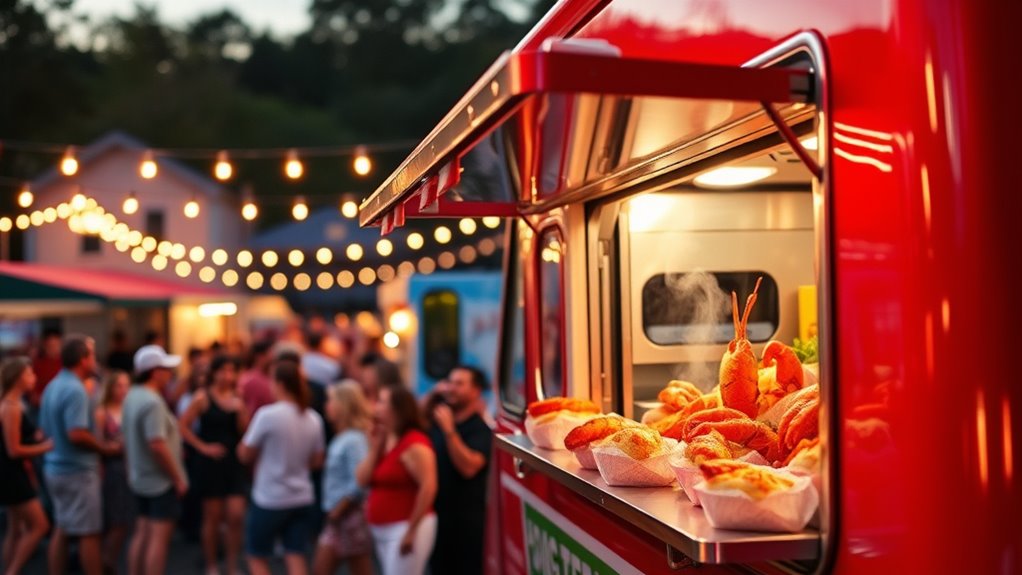
You’ll find some of the best seafood truck options at the Mill 5 Food Hub along Main Street, where high visibility draws in steady crowds. Downtown Lewiston also offers several spots where food trucks serve fresh lobster and regional seafood dishes, especially during events and festivals. These locations provide convenient and lively settings to enjoy Maine’s coastal flavors on the go. Many of these trucks promote their offerings through vibrant Instagram posts that highlight their seafood dishes, attracting both locals and visitors. Additionally, the use of sustainable fishing practices is increasingly emphasized in their marketing to appeal to environmentally conscious consumers.
Mill 5 Food Hub
Nestled within the renovated Bates Mill No. 5 building, the Mill 5 Food Hub has become a vibrant hub for seafood trucks and local culinary entrepreneurs in Lewiston. This innovative space offers a unique setting to enjoy fresh, local seafood. Here’s why you should visit:
- Shared commercial kitchens make it easier for seafood vendors to operate without high overhead costs.
- Large open spaces allow flexible setups for food trucks and pop-up stalls.
- Proximity to local suppliers ensures the freshest regional catches.
- The hub fosters collaboration with established businesses like breweries, enriching your dining experience.
- 150 Mill, 150 Mill St, Lewiston, ME 04240 is conveniently located near the food hub, making it easy to combine your seafood experience with other local amenities.
Downtown Lewiston Spots
The heart of Lewiston’s seafood scene beats in its downtown area, where food trucks gather near Main Street to attract both locals and visitors. Located under the Hopeful sign at Mill 5, this hotspot sees nearly 30,000 vehicles daily, ensuring high visibility and foot traffic. Positioned close to hospitals, government offices, and local businesses, it offers convenient access during busy hours. Food trucks here must have Maine and Lewiston licenses and stay at least 100 feet from restaurants, maintaining a fair competition. Popular seafood trucks like Mr. Sea’s Lobster Pound & Fry Shack, The Lobstah Buoy, and MacDaddy’s serve lobster rolls, fried seafood, and clams. Their central location makes it easy to enjoy fresh Maine seafood while exploring downtown’s vibrant community and culture. Additionally, the regulations for food trucks ensure safety and quality standards are met, benefiting both vendors and customers.
Challenges of Serving Fresh Seafood From a Mobile Kitchen
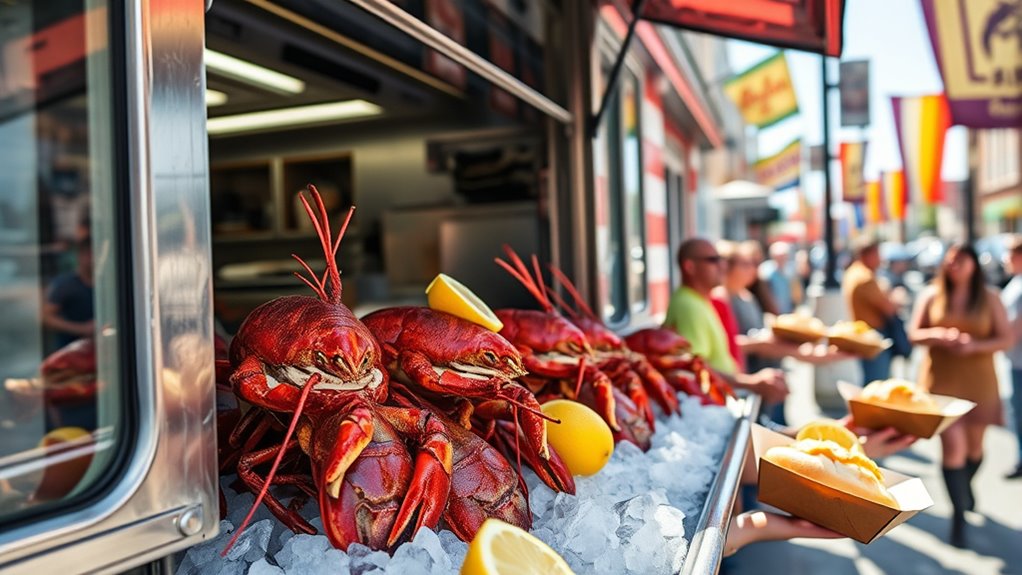
Serving fresh seafood from a mobile kitchen presents significant challenges, primarily due to the need for strict temperature control. Without proper management, seafood can spoil or become unsafe. Here are key obstacles you face:
- Maintaining ideal temperatures during transit and storage to prevent bacteria growth.
- Limited space in food trucks restricts refrigeration capacity, forcing quick turnover.
- The high cost of refrigerated vehicles makes consistent temperature control difficult.
- Ensuring proper packaging and sealing to preserve freshness during mobile service.
- Limited refrigeration options due to high ownership and operating costs make it difficult to keep seafood at optimal temperatures consistently. Additionally, food safety standards require rigorous monitoring and documentation, adding to the operational complexity.
Additional complexities include handling frequent, small shipments and unpredictable supply due to seasonality. You also must navigate regulatory compliance, staff training, and infrastructure limitations—all while keeping seafood safe, fresh, and compliant with health standards. These factors make serving fresh seafood from a mobile kitchen a demanding task.
Spotlight on Maine’s Lobster: Fresh, Local, and Mobile
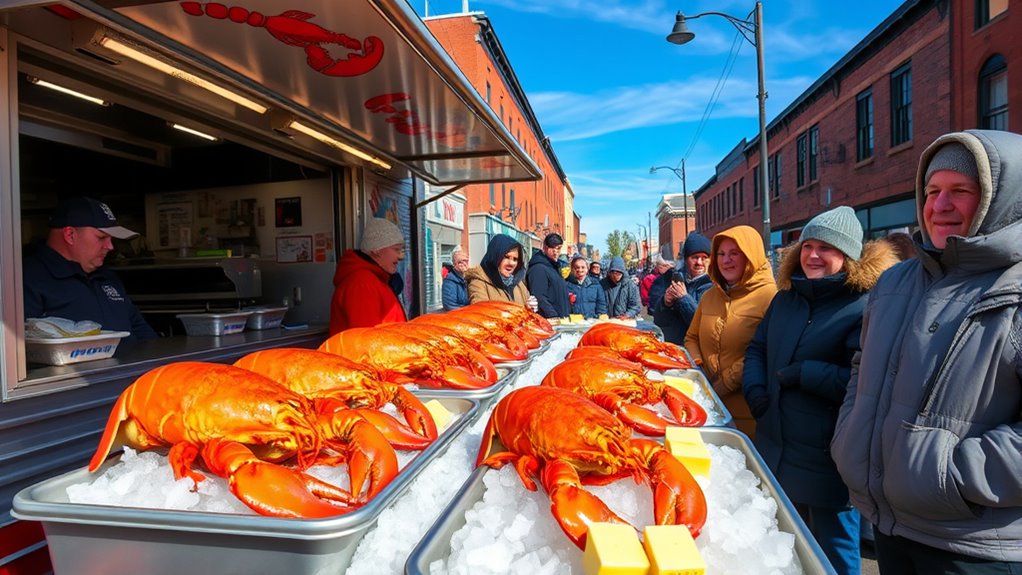
Maine’s renowned lobster industry offers a prime opportunity for food trucks to serve exceptionally fresh, local seafood. With over $1 billion contributed annually to the state economy, lobster remains a high-demand, premium product. Despite catch declines, lobstermen earned over $528 million in 2024, and prices averaged $6.14 per pound—second highest on record. Maine’s lobster is hand-caught year-round along the coast, ensuring fresh, local supply that’s ideal for mobile kitchens. Peak season from June to November offers tender, new shell lobster, perfect for serving in a food truck setting. Its nutritional benefits—low fat, high protein, and rich in essential nutrients—appeal to health-conscious customers. Leveraging Maine’s reputation for quality, your food truck can capitalize on the freshness and local sourcing that make lobster a standout menu feature. Recent scientific studies and monitoring efforts indicate that lobster populations are rebounding after environmental changes, underscoring the resilience and ongoing sustainability of Maine’s lobster industry. Additionally, the sustainable fishing practices employed help maintain the health of lobster populations for future generations.
Tips for Success in the Lewiston Seafood Food Truck Market

Success in the Lewiston seafood food truck market hinges on understanding and maneuvering local regulations, strategic location choices, and food safety standards. To excel, guarantee you:
Thriving in Lewiston’s seafood truck scene requires navigating regulations, strategic spots, and strict food safety standards.
- Obtain all necessary licenses, including the State of Maine and Lewiston mobile unit permits, and keep them current through regular renewals.
- Choose your location wisely—aim for high-traffic areas like Main Street near Mill 5, but stay at least 100 feet away from static restaurants.
- Prioritize food safety by using licensed commissary kitchens, maintaining sanitary standards, and adhering to health inspection protocols. Licensing ensures food safety and compliance with health regulations.
- Meet fire safety requirements through proper ventilation, fire suppression systems, and regular safety inspections.
- Maintain proper medication management and staff training for handling food safety incidents effectively, which can help prevent violations and ensure customer trust.
Staying compliant and strategic will boost your visibility, build trust, and maximize your success in Lewiston’s competitive seafood scene.
Frequently Asked Questions
What Are the Best Times to Find Seafood Trucks in Lewiston?
You’ll find seafood trucks in Lewiston mainly during weekends, especially from Friday to Sunday when foot traffic peaks. Evenings between 5 PM and 8 PM are your best bet for fresh catches. During summer months, trucks are more active, and special events or festivals often feature extended hours. Check social media or local listings for daily locations, as trucks frequently change spots based on events, weather, and licensing schedules.
How Do Seafood Trucks in Lewiston Source Their Fresh Lobster?
You’ll find that seafood trucks in Lewiston source their fresh lobster mainly from nearby Maine fisheries and lobster pounds, ensuring quick, local deliveries. They often partner with regional seafood distributors and lobster pounds like Mr. Sea’s, which provide live lobsters harvested just before service. These trucks rely on overnight shipping, temperature-controlled packaging, and close relationships with local vendors to keep their lobster fresh for signature dishes.
Are There Specific Permits for Seafood Trucks Selling Raw Versus Cooked Seafood?
You might think there’s a separate permit for raw versus cooked seafood, but Maine doesn’t require different licenses for each. Instead, you need specific food licenses and must follow safety rules. Selling raw seafood means you must display consumer advisories and handle products carefully to prevent contamination. Cooking seafood requires compliance with food safety codes, but both types fall under the same licensing framework, with distinctions in handling and labeling.
Can Seafood Trucks Operate Year-Round in Lewiston’S Climate?
You can operate a seafood truck year-round in Lewiston’s climate, but you’ll need to adapt to cold winters and heavy snowfall. Use insulated, heated trucks, and plan your schedule around weather conditions. Offering hot seafood dishes and setting up in covered markets can attract customers during harsh weather. With proper planning, equipment, and permits, you can maintain a successful outdoor seafood operation all year.
What Are Common Challenges in Maintaining Seafood Freshness on Mobile Units?
Maintaining seafood freshness on mobile units is challenging because you need strict temperature control, ideally near 32°F, to prevent spoilage. Fluctuations can cut shelf life in half, and limited space makes it hard to store enough refrigeration. You also need reliable power, proper hygiene, and quick handling to avoid contamination. Using insulated packaging, ice, and real-time temperature monitoring helps, but consistent management remains vital to keep seafood safe and fresh.
Conclusion
Now that you know the ins and outs of Lewiston’s seafood trucks, you’re all set to immerse yourself in Maine’s lobster scene. With fresh catches and vibrant food trucks, you’re about to experience seafood like never before—it’s practically a flavor explosion in every bite. So, get out there, explore the local hotspots, and let Maine’s legendary seafood adventures become your new obsession. Trust me, once you taste it, you’ll never settle for anything less!


